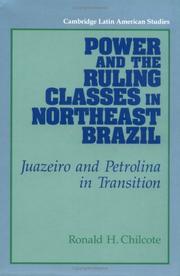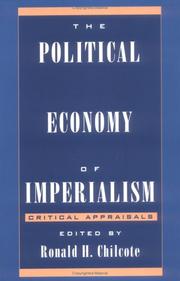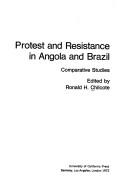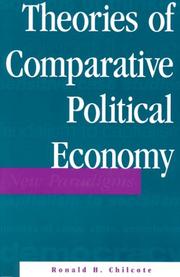| Listing 1 - 10 of 10 |
Sort by
|

ISBN: 0521373840 0521028817 0511527535 Year: 1990 Volume: vol 69 Publisher: Cambridge New York Sydney Cambridge University Press
Abstract | Keywords | Export | Availability | Bookmark
 Loading...
Loading...Choose an application
- Reference Manager
- EndNote
- RefWorks (Direct export to RefWorks)
This case study of the structure of power and ruling-class domination in the heart of the sertão of Northeast Brazil is based upon six field trips over a period of fifteen years. Analysis of the political economy of Juazeiro, Bahia, and Petrolina, Pernambuco - two contiguous towns along the São Francisco River - focuses on the history of patriarchal families, ruling class, and patrimonial governments. Family dominance is related to the rise of the Coelhos in Petrolina and the decline of the Vianas in Juazeiro. Agressive tactics and links to Recife allowed the Coelhos to expand and assume control over most commerce in Petrolina and neighbouring municipalities to Juazeiro. In both situations the intervention of the state in the region, usually bolstered by international credits, affected traditional standards of living. The construction of the Sobradinho Dam, for example, brought problems for small farmers along the banks of the São Francisco who could no longer count on the natural flow of river water. State policy also favored corporations to the detriment of small producers on cooperative farms.
Capitalism --- -Elite (Social sciences) --- -Market economy --- Economics --- Profit --- Capital --- Juazeiro (Bahia, Brazil) --- -Petrolina (Pernambuco, Brazil) --- -Economic conditions --- Economic conditions --- -Juazeiro (Bahia, Brazil) --- Elite (Social sciences) --- Elites (Social sciences) --- Leadership --- Power (Social sciences) --- Social classes --- Social groups --- Market economy --- Petrolina (Pernambuco, Brazil) --- Joazeiro (Bahia, Brazil) --- Juazeiro, Brazil (Bahia) --- Economic conditions. --- Juazeiro (Bahia, Brazil [Northeast ]) --- Petrolina (Pernambuco, Brazil [Northeast ]) --- Elite (Social sciences) - Brazil - Juazeiro (Bahia) --- Capitalism - Brazil - Juazeiro (Bahia) --- Juazeiro (Bahia, Brazil) - Economic conditions. --- Elite (Social sciences) - Brazil - Petrolina (Pernambuco) --- Capitalism - Brazil - Petrolina (Pernambuco) --- Petrolina (Pernambuco, Brazil) - Economic conditions. --- Social Sciences --- Sociology
Book
ISBN: 0195017072 9780195017076 Year: 1974 Publisher: New York (N.Y.): Oxford university press,
Abstract | Keywords | Export | Availability | Bookmark
 Loading...
Loading...Choose an application
- Reference Manager
- EndNote
- RefWorks (Direct export to RefWorks)
Partido Comunista Brasileiro --- Partido Comunista do Brasil --- History --- 328 <8=6> --- #SBIB:328H32 --- Parlement. Volksvertegenwoordiging. Regering en parlement--Latijns Amerika --- Instellingen en beleid: Midden en Latijns-Amerika --- -Partido Comunista do Brasil --- -Communist Party of Brazil --- PCB --- P.C.B. --- PC do B --- P.C. do B. --- PCdoB --- PC do Brasil --- KP Brasiliens --- Kommunistische Partei Brasiliens --- Communist International. --- Partido Comunista Brasileiro Revolucionário --- Ação Popular Marxista-Leninista do Brasil (Organization) --- Brazilian Communist Party --- -History --- 328 <8=6> Parlement. Volksvertegenwoordiging. Regering en parlement--Latijns Amerika --- Communist Party of Brazil --- History.
Book
ISBN: 0891589708 0891589716 Year: 1981 Publisher: Boulder, Colo. Westview
Abstract | Keywords | Export | Availability | Bookmark
 Loading...
Loading...Choose an application
- Reference Manager
- EndNote
- RefWorks (Direct export to RefWorks)
Comparative government. --- #SBIB:324H20 --- Politologie: theorieën (democratie, comparatieve studieën….) --- Political philosophy. Social philosophy --- Comparative government --- Comparative political systems --- Comparative politics --- Government, Comparative --- Political systems, Comparative --- Political science

ISBN: 0742510107 Year: 2003 Publisher: New York : Rowman and Littlefield,
Abstract | Keywords | Export | Availability | Bookmark
 Loading...
Loading...Choose an application
- Reference Manager
- EndNote
- RefWorks (Direct export to RefWorks)
Imperialism --- Capitalism. --- Economic development --- Impérialisme --- Capitalisme --- Développement économique --- Economic aspects. --- Aspect économique

ISBN: 0520018788 Year: 1972 Publisher: Berkeley, Calif. University of California Press
Abstract | Keywords | Export | Availability | Bookmark
 Loading...
Loading...Choose an application
- Reference Manager
- EndNote
- RefWorks (Direct export to RefWorks)
History of Latin America --- Sociology of minorities --- National movements --- History of Africa --- Brazil --- Angola --- Nationalism --- History --- Politics and government.
Book
ISBN: 1316083152 1316057151 1316054780 131608079X 1107417619 1316071332 1107785294 1316076067 1316073696 1316078434 1107071623 1322177066 9781107785298 9781316073698 9781107417618 9781107071629 Year: 2014 Publisher: Cambridge : Cambridge University Press,
Abstract | Keywords | Export | Availability | Bookmark
 Loading...
Loading...Choose an application
- Reference Manager
- EndNote
- RefWorks (Direct export to RefWorks)
This book discusses twentieth-century Brazilian political thought, arguing that while Rio de Janeiro intellectuals envisaged the state and the national bourgeoisie as the means to overcome dependency on foreign ideas and culture, São Paulo intellectuals looked to civil society and the establishment of new academic institutions in the search for national identity. Ronald H. Chilcote begins his study by outlining Brazilian intellectuals' attempt to transcend a sense of inferiority emanating from Brazilian colonialism and backwardness. Next, he traces the struggle for national identity in Rio de Janeiro through an account of how intellectuals of varying political persuasions united in search of a political ideology of national development. He then presents an analysis by São Paulo intellectuals on racial discrimination, social inequality, and class differentiation under early capitalism and industrialization. The book concludes with a discussion on how Brazilian intellectuals challenged foreign thinking about development through the state and representative democratic institutions, in contrast to popular and participatory democratic practices.
Intellectuals --- Political culture --- Nationalism --- National characteristics, Brazilian. --- Brazilian national characteristics --- Consciousness, National --- Identity, National --- National consciousness --- National identity --- International relations --- Patriotism --- Political science --- Autonomy and independence movements --- Internationalism --- Political messianism --- Culture --- Intelligentsia --- Persons --- Social classes --- Specialists --- Political activity --- History --- Brazil --- Intellectual life
Book
Year: 1970 Publisher: Stanford (Calif.) : Hoover institution on war, revolution and peace,
Abstract | Keywords | Export | Availability | Bookmark
 Loading...
Loading...Choose an application
- Reference Manager
- EndNote
- RefWorks (Direct export to RefWorks)
Book
ISBN: 0865314578 Year: 1982 Publisher: Boulder (Colo.) : Westview press,
Abstract | Keywords | Export | Availability | Bookmark
 Loading...
Loading...Choose an application
- Reference Manager
- EndNote
- RefWorks (Direct export to RefWorks)

ISBN: 0813310180 0813310199 Year: 2000 Publisher: Boulder (Colo.) : Westview Press,
Abstract | Keywords | Export | Availability | Bookmark
 Loading...
Loading...Choose an application
- Reference Manager
- EndNote
- RefWorks (Direct export to RefWorks)
Book
Year: 1969 Publisher: Stanford (Calif.) : Hoover Institution on War, Revolution, and Peace, Stanford University,
Abstract | Keywords | Export | Availability | Bookmark
 Loading...
Loading...Choose an application
- Reference Manager
- EndNote
- RefWorks (Direct export to RefWorks)
Nationalism --- Bibliography --- Africa, Portuguese-speaking --- Portugal --- Bibliography. --- Colonies
| Listing 1 - 10 of 10 |
Sort by
|

 Search
Search Feedback
Feedback About UniCat
About UniCat  Help
Help News
News